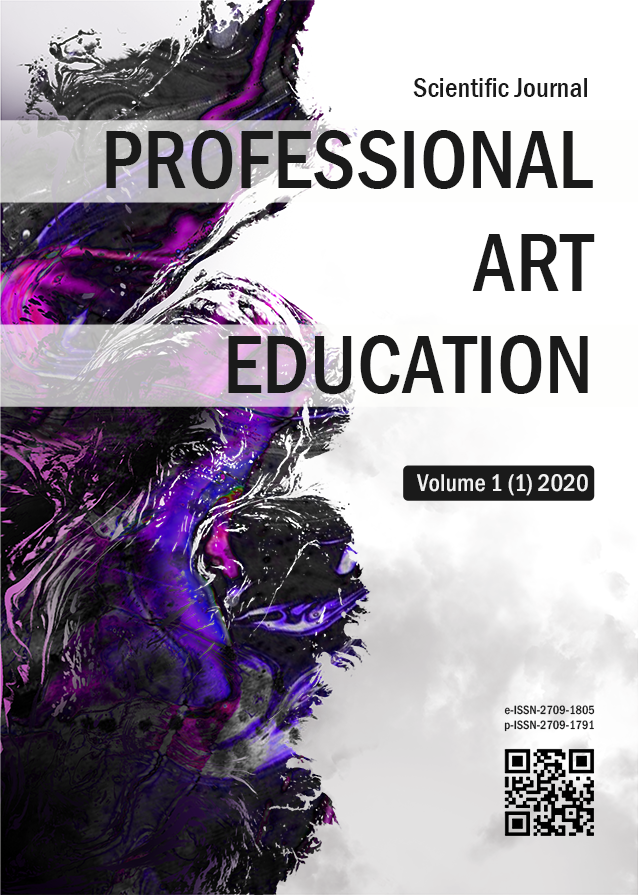Specificity of Students’ Creative Self-Expression in the Process of Conductor-Choral Education
DOI:
https://doi.org/10.34142/27091805.2020.1.01.02Keywords:
self-expression, expressioncreativity, creativitypersonality, personalityconductor, conductorchoir, music education, educationindividuality, individualitysubjectAbstract
Object. The article considers the issues of the future singers` and choral conductors` creative self-expression in the process of conductor-choral education. Methods. Analytical, historicalcomparative, retrospective method was used in writing the article. Results. As a result of the analysis and generalization of scientific psychological-pedagogical and art-literary literature, comparison,
comparison of different opinions the definition of the concept «creative self-expression of students» is presents. It means a conscious act of discovering and affirming the individual, personal and subjective capabilities of the «I am» as a professional, defining himself as a creative person and individuality. The advantages of the study are to identify the specifics of future singers` and choir conductors` creative self-expression as students of higher education. The success of individual psychological self-expression
is determined by good health, muscle activity, development of singing and conducting apparatus, students` cognitive and emotional sphere. A positive factor in the student` personal and professional self-expression is the formation cognitive and professional interests, spiritual values, character traits that are regulators of singers` and conductors` professional growth as creative individuals. Prominent indicators of the growth of singers` and choir conductors` creative self-expressio, their leading professionally important qualities are musicality as an integrative musical ability (musical hearing, metro-rhythmic ability, musical memory, musical thinking, musical imagination) and performing skills (performing reliability, artistry, instrumental, vocal and choral, conducting skills). The specifics of future singers` and choir conductors` personal self-expression are determined (on the basis of diagnosis) as a level of cognitive and professional interests, ideals and value orientations on spiritual and national-civic values. Conclusions. The study summarizes a set of character traits that form the basis of singers` and choir conductors` professional success of (honesty, loyalty to the beauty, the ability to consciously and artistically embody it in the choral sound; friendliness, responsibility, optimism).
It was found that the level of students` creative self-expression as a subject of his own professional development depends on the timely diagnosis, stimulation, content and procedural support the process of his professional «I am» – concept formation. It is proved that the contradiction between the real and the ideal «I am» becomes the source of the singers` or choir conductors` personal and professional development. On the basis of scientific research on professional acmeology the ways of singers` and choir conductors` creative self-expression as bright individuals (integration of individual, personal, subjective structures into integrity, identification of specificity of individuality, selection of content of own «I am», systematization and generalization of individual and specificity self-expression taking into account all factors, identifying the uniqueness of the relationship of all substructures, determining the social orientation of their own self-expression in further professional activities).
Downloads
References
Кифенко, А. М. (2018). Розвиток музично-слухової активності в навчальному хоровому колективі. Експериментальні та теоретичні дослідження в сучасних науках: матеріали Міжнародної науково-практичної конференції, Суми, 73–75.
Колесников, В.Н. (1996). Лекции по психологии индивидуальности. М ; МГУ.
Лосев, А.Ф. (1990). Основной вопрос философии музыки. Форма-стиль-выражение. Монография. М: Мысль, 405-602.
Лузік, Е.В. (2003) Розвиток творчих здібностей студентів у процесі науко-во-дослідної роботи. Лузік. К.: ІВО АПН України, 9 с.
Михаськова, М.А. (2004). Особливості й проблеми музично-освітньої діяльності студентів музичних факультетів вищих закладів педагогічної освіти. Ніжин: НДПУ, 185 с.
Падалка, Г. М. (2008). Педагогіка мистецтва (Теорія і методика викладання мистецьких дисциплін). К. : Освіта України, 274 с.
Рибалка, В.В.(2003). Методологічні питання наукової психології. Київ: Ніка-Центр, 77–87.
Романовський, О.Г.(2011). Педагогіка успіху: підручник для студентів вищих навчальних закладів. Харків НТУ «ХПІ», 106-113.
Смирнова Т.А. (2008). Теорія та методика диригентсько-хорової освіти у вищих навчальних закладах: психолого-педагогічний аспект. Монографія. Видавництво «Ліхтар», 149–173.
Смирнова, Т.А. (2018). Хорознавство: історія, теорія, методика: навчальний посібник, Харків, 180.
Downloads
Published
License
Copyright (c) 2020 Смирнова Тетяна Анатоліївна (Автор)

This work is licensed under a Creative Commons Attribution-NonCommercial 4.0 International License.















